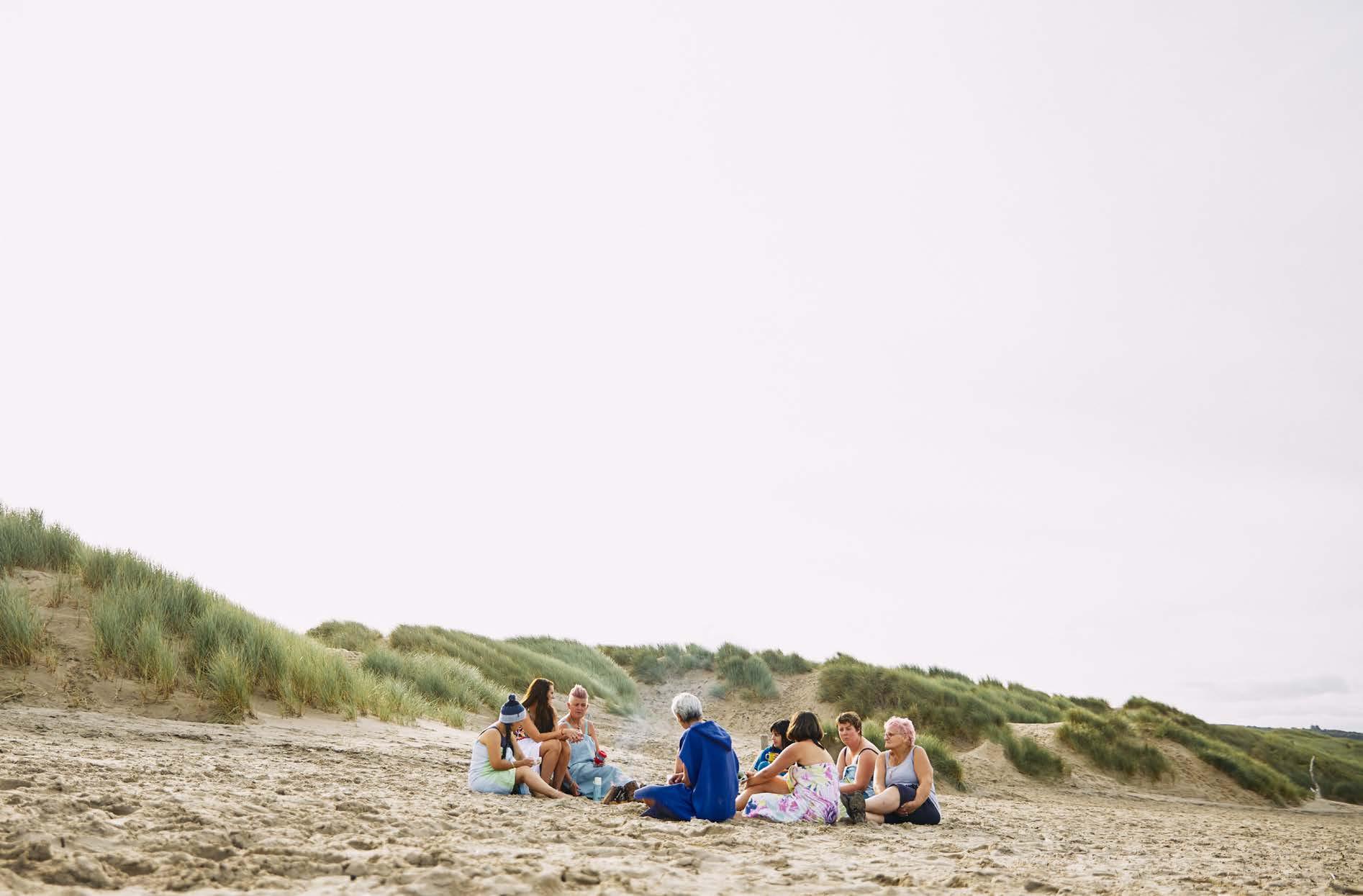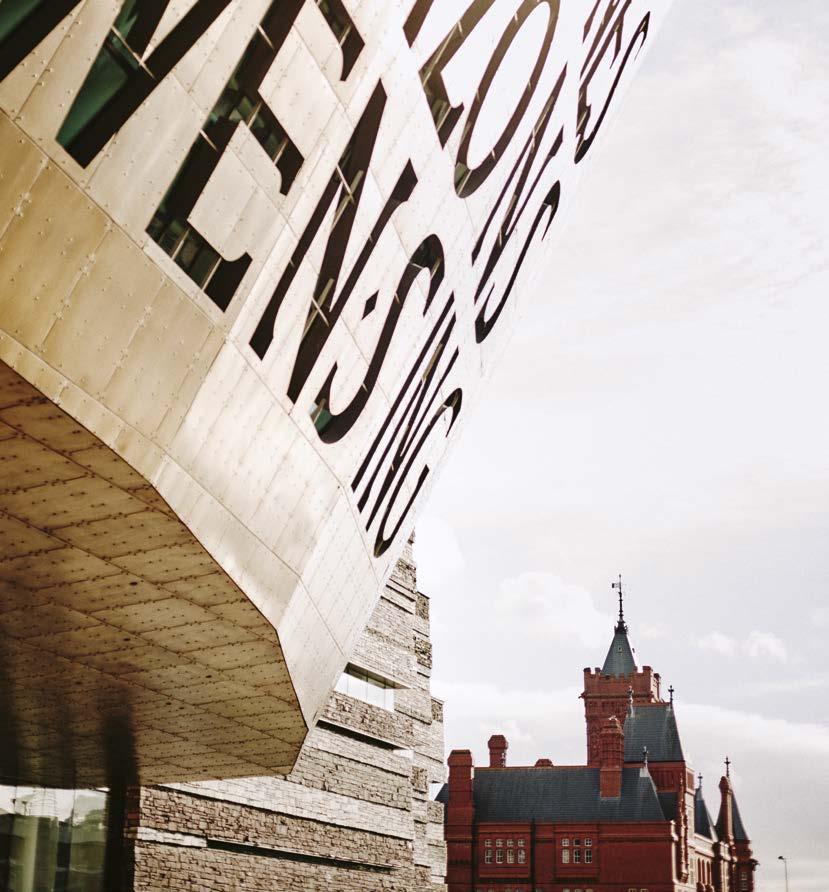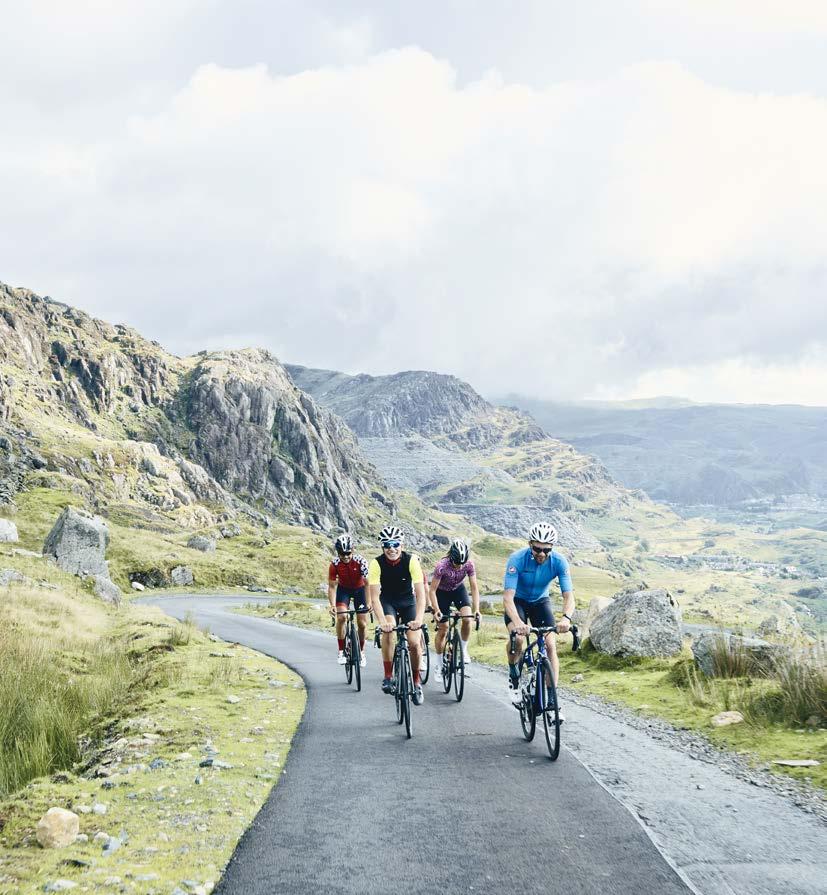
11 minute read
Wellbeing priorities
Our core ambition is to grow tourism for the good of Wales. But how do we do that? Wales is the first country in the world to put forward legislation that mandates wellbeing. This means that when public bodies make decisions, they need to take into account the impact they could have on people living their lives in Wales in the future. We know that by enabling people to enjoy experiences in places across Wales, tourism can contribute to the wellbeing of wider society, enhancing communities and their way of life, and helping them to value and protect the natural and historic environment. But it is clear that tourism and the travel industry need to be carefully managed in order to find ways to reduce some of the potential negative impacts, such as over-tourism and carbon emissions from travel. Growing tourism for the good of Wales means economic growth that delivers benefits for people and places including environmental sustainability, social and cultural enrichment and health benefits. This is how we will deliver those wider benefits through the priorities in this plan: Goals
Economic growth that delivers benefits to people and places including:
Environmental sustainability
– sustaining natural resources – improving environmental performance – encouraging sustainable transport
Social and cultural enrichment
– a warm welcome for everyone – opportunities for young people – thriving Welsh language and culture
Health benefits
– new opportunities to enjoy outdoor leisure – promoting active lifestyles
Listening to residents, visitors and businesses
Environmental sustainability.
Sustaining natural resources.
Our core offer is based on outstanding landscapes cared for by everyone - accessible, protected natural landscapes including our marine environment. Many of the organisations in Wales who care for our natural resources – such as Natural Resources Wales, our National Parks, wildlife and marine conservation organisations, and even organisations such as Welsh Water – are increasingly providing high quality experiences for visitors. Their tourism offer enables more people to enjoy our wonderful natural resources, but also helps to make those organisations more sustainable. We will continue to work with natural heritage, marine and countryside organisations helping them to develop their visitor offer.
Improving environmental performance.
Prosperity for All: A Low Carbon Wales sets the foundations for Wales to transition to a low carbon nation in a way that maximises wider benefits for Wales, ensuring a fairer and healthier society in line with the UK Government’s net zero emissions target and the Welsh Government’s declaration of a climate emergency. Tourism is both an opportunity and a challenge in terms of decarbonisation. Transport accounted for 16% of Welsh emissions in 2016. Of this 54% is from cars, 1% is from railways and 1% is from international flights. On the other hand there are opportunities to reduce carbon emissions through the way businesses operate, and also by encouraging more sustainable travel. In future we will continue to seek ways to improve the environmental performance of tourism businesses, through for example: – continuing to develop our sustainability toolkit that helps businesses look at energy, waste, water, biodiversity and pollution, reflecting the updated Welsh Government Climate Change Adaptation
Business Tool, and – proactively developing and marketing sustainable travel – especially to UK markets and international visitors travelling to Wales via key transport hubs in England and Ireland. We will also expect the capital projects we fund to commit to reducing their carbon footprint in-line with the four elements of our Economic Contract and in-line with the policies in A Low Carbon Wales. As part of our grading scheme, we will continue to work with businesses to help them reduce their carbon footprint, and work with key international trade partners to encourage them to operate in a more sustainable way.
Encouraging sustainable transport.
One of the big priorities for the Low Carbon Action Plan is to reduce transport sector emissions by 43% from baseline levels by 2030. That plan suggests that the most effective way of doing this in the near term is to replace car journeys with public transport and active transport. The plan also encourages the take-up of electric vehicles, so to help do this, we will explore options for electric charging points as part of tourism infrastructure, including The Wales Way. Although the contribution that international flights make to transport emissions in Wales is relatively low, and international visitors to Wales use for example Manchester, Birmingham and Liverpool airports as well as Cardiff Airport, we recognise that it is still an issue for Wales. Rather than discouraging international travel – which makes an important long-term contribution to jobs and spend in Wales – we will work with Cardiff Airport and others to investigate new approaches to carbon offsetting that benefit Wales. Over-tourism is a potential issue in some areas of Wales, so as well as aiming to spread tourism across Wales, we will explore the use of ‘Big Data’ to track visitor flows at peak periods and in specific areas.
Social and cultural enrichment.
Providing a warm welcome for everyone.
Over the past five years we have delivered more inclusive tourism in Wales through, for example, funding better access to holiday accommodation and visitor attractions. Our grading scheme also asks businesses to ensure that everyone feels welcome. But accessibility is a growing issue. As we – and our visitors – get older, more and more of us will face challenges in relation to access. Already around one in four of us in Wales is recognised as being disabled – the highest percentage in the UK. A quarter of overnight visits and tourism day trips in Wales by GB residents include someone in the party with an impairment. As well as being important in their own right, accessible businesses and targeting accessible markets, make good economic sense. Around £5.45 billion is spent by domestic overnight visitors where a member of the party has an impairment, and that share is growing in both volume and value. This represents around £440 million in Wales. Many of these groups also include young people as more and more families enjoy multi-generation holidays. It is important that the experience of visitors to Wales reflects our commitment to supporting disabled people, and removing the barriers and obstacles which might prevent everyone from enjoying their time here to the maximum. The Welsh Government’s Action on Disability Framework commits us to implementing the social model of disability – recognising that attitudes and facilities create problems, not individual medical conditions. Tourism can play a key role in promoting this model and putting it into practice, through improving access to facilities and through staff training. This approach aligns closely with the new UK Sector Deal for Tourism commitment to making the UK the most accessible destination in Europe by 2025. This plan aims to ensure that everyone who travels in Wales can be confident that they will receive a warm welcome. We will do this by ensuring that accessibility and inclusivity cut through everything we do, for example: – via the new focus on funding for Brilliant Basics which will feature accessibility, – by expecting all developers to design in excellent access from the start through
Universal Design standards,
Opportunities for young people.
Memories of childhood holidays stay with us throughout our lives. We want to help as many children in Wales as possible to take a holiday in Wales and will actively work with the industry to find new opportunities to make this happen. We will also work with partners and the private sector to establish (possibly as part of Wales Tourism Week) a festival of free/subsidised experiences for children (including young carers) under a groundbreaking kids orientated campaign brand. The aim will be to bring Wales' wide range of experiences to new audiences, whilst growing pride and building our reputation as an inclusive, family-orientated destination that is welcoming to all. We also believe that everyone’s wellbeing is important, and that everyone deserves a break, whatever your circumstances. In line with the Welsh Government’s integrated approach to health and social care, we will encourage the sector to work with public, private and third sector services providing access to, or delivery of social care and support, as well as preventative information, advice and support.
Listening to resident, visitors and businesses.
This plan is about people. At the heart of this plan is the idea that what is good for visitors can be good for everyone in Wales. This means that we need to make sure that local people are benefiting from – and comfortable with – a thriving visitor economy. We need to learn more about how people in Wales feel about tourism. We will listen to the voices of residents, alongside the work we already do with the sector through our business barometer and our regular visitor satisfaction surveys. We want a more rounded view of tourism growth – it’s positive impacts, and areas of future concern. We will use the results to inform open regional Tourism Forum sessions once a year in communities facing the greatest pressures, to discuss future policy ideas and improvements that achieve the best possible balance between visitor expectation and local satisfaction. Through our ongoing annual tourism roadshows, we will also do more to engage with local community groups (including youth groups) alongside traditional industry players.
Thriving Welsh language and culture.
The distinctive culture and living language of Wales are a source of strength to the people of Wales. We want visitors to feel this energy, and for Welsh culture and language to enrich their experiences. Culture in Wales is many things. It is captured in our amazing monuments, or the towns and landscapes shaped by Welsh history. It is grounded in the stories, myths and traditions of Wales, and in the richness of the Welsh language. And it is continually rediscovered and reinvented by each new generation, through music, literature, film, arts and events. Tourism, culture and language are closely interlinked. The tourism sector provides the accommodation, facilities and infrastructure that enable our young people to work in their communities, and our guests to learn about, access and enjoy Welsh culture and language. Heritage is an important part of our culture, and over the past five years tourism has made a significant contribution to heritage in Wales through helping to revitalise historic towns, finding creative new uses for historic buildings, or enabling people to have amazing adventures in former industrial landscapes. Looking forward, there is more to be done; in line with Cymraeg 2050 - Welsh Government’s national strategy for the Welsh language, this plan embeds protecting and promoting our sense of place, culture and language in all our future activity through clearer guidance for investment partners, through our work to support indigenous events, by delivering enhanced sense of place programmes, through the new quality assurance scheme and in all our brand marketing work. We will also look to support initiatives to develop specific Welsh cultural bookable products and experiences – that are both authentic and highly contemporary – to promote at events and online in future.

Health benefits.
Wales is moving from a hospital-based approach to health, to one that also recognises the importance of social factors such as physical exercise or loneliness and isolation, and these are areas where tourism can make a difference. Taking a break is important, not just to our physical health, but also has long term social benefits, through the time taken to relax, reconnect with friends and family and get away or – for young carers – to just be kids. There is also research by Public Health Wales which has explored the contribution of outdoor leisure and recreation to good health. But although more than 80% of adults in Wales take part in some type of outdoor recreation at least once a year, only 18% do so regularly. We are a long way away from our targets on growing physical activity in Wales. A Healthier Wales is the Welsh Government’s long-term vision for health and social care. It sees prevention, health improvement and inequality as keys to delivering the wellbeing of future generations in Wales. Tourism can contribute to this cross-government priority in many ways: tourism generally helps to sustain the basic social infrastructure – from parks to public spaces – that enrich the lives of locals as well as visitors.
New activity and wellbeing opportunities.
We will invest in facilities – including flagship investments – that generate pride in Wales' adventure offering and that provide access to a wide range of visitors – including our communities – to new activity and wellbeing opportunities. This will include ensuring that we deliver activity/outdoor facilities near major population hubs, such as, South East Wales and working with partners on initiatives such as the Wales Coast Path. We will also ensure that adventure and activity are core to the Wales brand and our marketing work in Wales.
Promoting active, connected lifestyles.
Ultimately tourism is about experiences and connections – whether it is visiting new places and making new friends, or reconnecting with friends and family and familiar places. Whether taking part in outdoor adventures, or simply exploring new places, often on foot, we tend to be more active on holidays. Our Welsh landscape, culture and adventure offering is for everyone – and we will do more to promote it not just to visitors, but to everyone in Wales.








